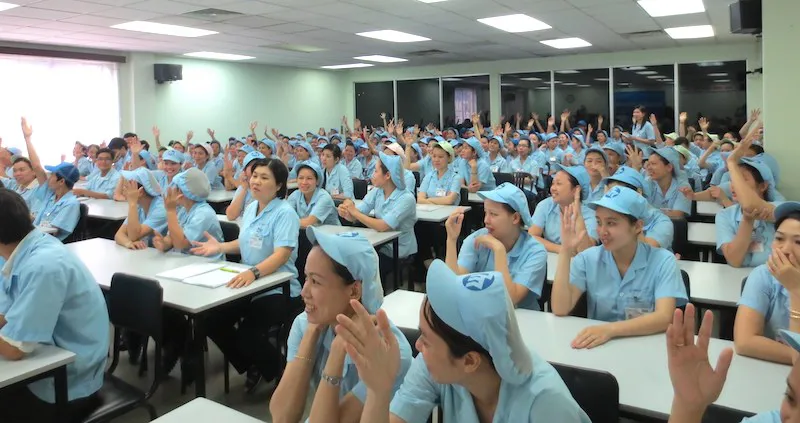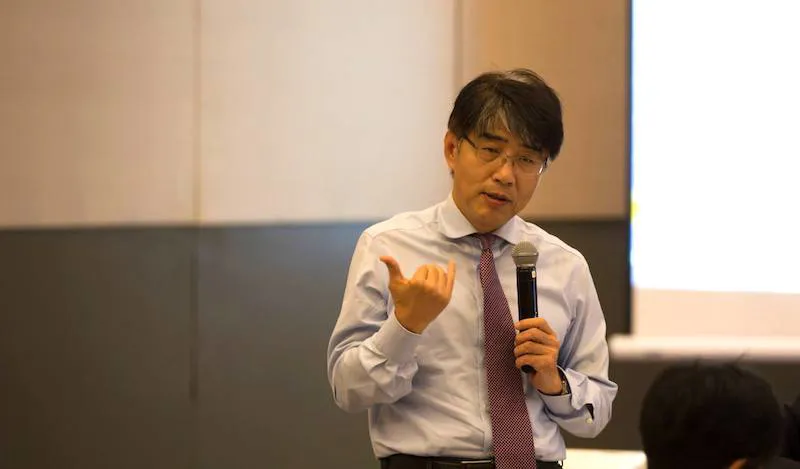Vietnam needs focus on effective wage negotiation
Effective wage negotiation is key to expand the domestic market as engine for post-pandemic growth.
Workers are both consumers and producers, International Labor Oganization Vietnam Director Chang-Hee Lee emphasized when sharing his thoughts on the role of the Vietnam Trade Union on the occasion of May Day.
| Vietnamese workers are consumers and producers. Photos: the ILO Vietnam |
What do you think about the roles of the Vietnam Trade Union (VGCL) in protecting rights and interests of workers at enterprises?
VGCL has 92 years of history. Established in 1929, it has a proud history of defending the interests of Vietnamese people and Vietnamese workers by fighting against foreign aggression for independence, and joining force to unifying the country, and building the new economy.
The challenges and missions change over time. But one primary mission of trade unions of any country is always the same. It is protecting and representing the interests and rights of workers and their families.
I believe the Trade Union in Vietnam has done their best to represent and protect the rights and interests of workers. Sometimes it was given less emphasis as there were more overriding concerns of the time, such as fighting for independence or joining force for building the country.
However, with the current deepening market reform and international integration, the Vietnam Trade Union should focus on its primary function of representing and protecting workers’ interests and rights. Only when trade unions effectively represent voices of workers while closely collaborating with employers and government, trade union can make genuine contributions to political stability and economic development.
At enterprises, unions most of time closely work with employers. But at times unions have to stand up against employers to protect workers’ rights and to advance workers’ interests. That’s when unions can show their values. But it is not an easy job.
In Vietnam, there are two situations.
First, courageous union leaders can be transferred somewhere else or even their contracts may not be renewed. It’s called unfair labour practices.
The other situation is grassroots trade union leaders are actually human resources managers or senior managers. So, they are part of employers, therefore have difficulties in voicing for workers.
The 2019 Labour Code, which came into effect on 1 January 2021, has made important improvements on these situations. There are much tougher regulations against unfair labour practices. In addition, the 2019 Labour Code does not allow senior managers to join union and there should be separation between union and management.
I hope trade unions will use these legal provisions so that they can protect workers rights more effectively.
How do you see the trade union’s efforts for renovation to better represent workers’ rights and interests over the past years?
For the last 20 years, VGCL has made significant innovations towards fulfilling its basic roles and functions.
Let me give some examples of innovation.
First, you can see their new way of organizing, which is called “bottom-up” organizing. Ten to 20 years ago, the Federation of Labour (FOL) just went to enterprises and asked employers if they would allow unions. Once employers agree, FOL would let employers do whatever they could in setting up and ‘managing’ trade unions. But under the bottom-up organizing, FOL will first talk to workers, which promises strong bond between workers, grassroots union and FOL.
This is a very important change because in the traditional “top-down” organizing method, unions were highly likely to come under the influence of employers. But with the “bottom-up” approach, unions are more likely to become real organizations for, of and by workers.
Second, look at collective agreements 10-20 years ago, it was only the signing of those agreements without real talks between employers and workers. But now we see the real process of discussion between the two sides, not all enterprises, but many enterprises.
And before, collective agreements were concluded only at the enterprise level, but now many localities see the so-called multi-employer collective bargaining. Working conditions in the same sector in the same locality are more or less the same. So, there is no reason why we have to negotiate enterprise by enterprise. Therefore, multi-employer collective bargaining is an important progress, an innovation of trade union.
| ILO Vietnam Director Chang-Hee Lee |
I see this as the development towards the right direction and I encourage it. If VGCL can move faster and more systematically, it will be better not just for Vietnamese workers but also for the Vietnamese society, as it will contribute to economic development and social stability.
Syndicates is another example. This is a sort of union of workers who work for micro and small enterprises, such as hairdressers, rickshaw drivers. Due to small size of enterprises, it is hard to organize them by enterprises. Instead, it organizes workers by locality and occupation.
This has existed under VGCL for many years, but it has not gained proper recognition and support. Given that there are many such workers, most of whom are vulnerable, this type of unions should be promoted and supported.
What are the trade unions’ impacts in developing national wage policies?
Wage policy is the area where the trade union has done really a good job in representing workers’ interests in minimum wage fixing.
In 2013, the National Wage Council was established, based on the 2012 Labour Code. It brought really profound changes.
Before 2013, minimum wages were fixed by the Government alone without true engagement of VGCL and VCCI and other business voices.
Since 2013, minimum wages were fixed through consultation and sometimes, negotiation among three parties – MOLISA, VGCL and VCCI and other business associations, representing the voices of workers and employers, respectively. At National Wage Council meetings, VGCL always insists that the Government and other parties should aim to improve the livelihood of workers and their families when fixing minimum wage. They always advocate for workers’ voice in the minimum wage fixing process.
How about collective bargaining on wages at grassroots level?
Regarding collective bargaining agreement, compared to 10 years ago, I see improvements. There are more enterprises with collective bargaining agreements, and more collective agreements with provisions higher than minimum legal conditions. But one thing is missed out in most collective agreements – wage.
I would like to bring your attention first to Resolution No.27 of the Party Central Committee on wage policies. It is an extremely important document which should guide industrial relations actors in deciding wages and other working conditions.
There are three important things in the Resolution. First, it says that the State should not intervene in enterprise-level wage fixing process. Second, it recognizes importance of minimum wage, but also recognizes its limitation – that minimum wages can only protect the most vulnerable workers in the labour market. It cannot be used to determine actual wages of every worker. Third, the Resolution encourages trade union and employers to fix actual wages through collective bargaining.
The Resolution sets clear guidance on how wages should be fixed, and this is fully aligned with the ILO’s international labour standards. Unfortunately, this is not happening yet in most enterprises. Some fringe benefits such as lunch allowance or 13th monty bonus may be included in the collective agreement, but not monthly wages or salaries. In all other countries, wages are the most important item for collective bargaining.
Wages which are a result of collective bargaining are important not only for better working and living conditions of workers and their families, but also for shared prosperity of entire society and economy.
When wages are bargained collectively, workers can gain better share of productivity gains of company, than wages which are not collectively bargained, due to enhanced bargaining power. It ensures more equitable distribution of economic gains between employers and workers.
Vietnam has ambition of moving towards higher middle- income country from lower middle income country. To reach higher middle-income country, Vietnam needs to rely not only export engine but also domestic consumption engine of the economic development.
Domestic demand comes from domestic consumption by Vietnamese citizens, most of whom are workers. So higher purchasing power of workers is important, and it comes from higher wages.
With the Covid-19, Vietnam’s tourism industry has rediscovered the value of domestic tourists. The country should rediscover importance of workers not only as producers but also as consumers, who will be one of twin engines of economic development, together with foreign consumers buying Vietnamese exports.











